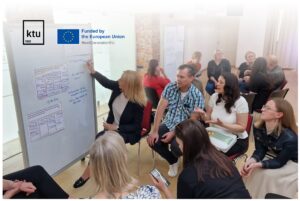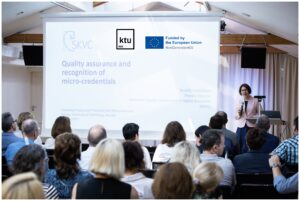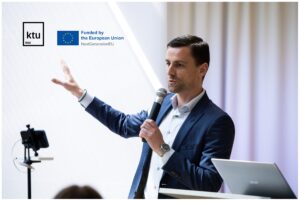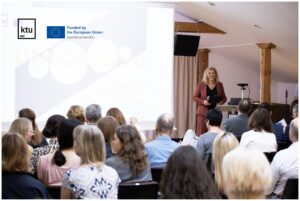In today’s fast-changing world, traditional ways of learning are no longer the only pathway to acquiring knowledge and skills. Micro-credentials certify the learning outcomes of short-term learning experiences as a course or training. Several European countries are already using this tool, but is the Lithuanian higher education system ready to establish it?
“Due to the green and digital transitions, including emerging technologies, and the ensuing changes in the labour market, many workers need to reskill and upskill. This challenge, among others, is driving the development of micro-credentials in the European Union and beyond. Thanks to the adaptability of micro-credentials to the needs of the labour market and their accessibility to a wider audience, the micro-credentials system can be an excellent tool for upskilling and reskilling,” says Agnieszka Jelnicka, Policy Officer of the Directorate-General for Education, Youth, Sport, and Culture at the European Commission.
Micro-credentials are expected to be standardised and provide knowledge and skills that meet not only personal but also the labour market needs. Personal learning experiences will be converted into digital documents – badges that learners can keep in their personal digital wallets.
This tool for acquiring and recognising competencies was presented and analysed at the conference Unlocking Professional Potential with Micro-credentials. The event was organised by Kaunas University of Technology (KTU) for the Lithuanian academic community.
Micro-credentials in Lithuania?
A micro-credentials ecosystem that promotes collaboration between students, businesses, and higher education is part of the European Commission’s vision for European Education. Ireland and the Netherlands have already become leaders in this field. According to Aurelija Valeikienė, Deputy Director at the Centre for Quality Assessment in Higher Education, it is necessary to consider the establishment of the micro-credential system in Lithuania.
According to Ms Valeikienė foreign students sometimes lack certain knowledge or their level is weaker. Therefore, micro-credentials could help compensate for these shortcomings.
Experts said that the real benefits of micro-credentials depend on quality standards – it is important that the system is recognised internationally, not only in higher education but also in the labour market.
According to Mark Brown, Ireland’s First Chair in Digital Learning and Director of the National Institute for Digital Learning, Dublin City University, micro-credentials firstly must be established in universities.
KTU is an active contributor to the development of educational innovations in Lithuania, as it is one of the thirteen members of the European Consortium of Innovative Universities (ECIU), which is developing a joint ECIU University. It aims to create an innovative university that responds to the needs of society and business.
“The ECIU University develops European digital credentials. These micro-credentials will comply with European Union standards and will be particularly convenient for the learner and the employer, as the skills and knowledge acquired by the student will be described in detail,” says Padmasheela Kiiskilä, a teacher at Tampere University and researcher in micro-credentials.
Successful practice in Estonia
One example of a successful micro-credential system in the Baltic States is the Estonian Business School (EBS). EBS was the first university in Estonia to offer micro-degree programs – a Master’s degree focusing on five areas: sustainability and the green economy, digital transformation, communication and marketing, management and leadership, finance, and accounting.
The EBS micro-credentials, also known as micro-degrees, have been set up in close cooperation with the country’s employment office. However, Jim Seltenrijch, the Head of Master Studies and Micro-degrees at EBS, accountable for the further development of education programs, says that setting up the scheme was challenging: “Setting up the micro-credentials has been particularly tricky, but the demand for this project is high. The challenge is to keep up with the needs of the labour market and to adjust the learning content quickly.”
“We plan that once a certain number of credits have been taken and a final project has been prepared, the student can obtain a diploma. We will also issue a large number of credits in the first year and allow students to spread out the study load over a selected period of time in the remaining years,” says Mr Seltenrijch.
The event Unlocking Professional Potential with Micro-credentials was funded by the European Union NextGenerationEU within the framework of the project “Implementation of the activities of the United European University in order to strengthen the quality, internationality and accessibility of Kaunas University of Technology studies”.






